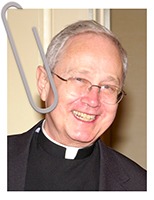“What is the most important thing that the church needs to be doing in the world today?”
Some say it needs to comfort those who are uncomfortable.
Others would say it needs to challenge the comfortable.
Which would you say?
I think the answer is both.
Challenges
Which challenges?
People from the pews view challenges quite differently. It depends on what side of the middle aisle they prefer. But… there is no doubt that all the challenges named are valid and important.
Here is a post from Fr. Ron Rolheiser that challenged me.
Perhaps, we as church need to speak something else to the world before we speak these other challenges or certainly concomitant with them.
Isaiah was no slouch at challenging God’s People. Yet he knew the importance of comfort. “Comfort, O comfort my people, says your God.” (Isaiah 40:1)
Echoes of Isaias
Fr. Rolheiser tells how he heard this echo from Isaiah from an elderly deeply respected priest. Legally blind, and semi-retired, he celebrated mass every day, heard occasional confessions, and spent most of the rest of his time praying.
“One evening, sitting with him, I asked him: “Father, if you had your life as a priest to live over again, would you do anything differently?” I was expecting him to say no, given his obvious goodness and fidelity. His answer surprised me.
“If I had my priesthood to live over again,” he said, “I would be a gentler with people the next time. I would console more and challenge more carefully.
I was one of those people who was taught and who deeply believed that only the full truth can set us free, that we owe it to people to challenge them with the truth, in season and out. I believed that and did it for most of the years of my ministry. And I was a good priest, I lived for others and never once betrayed in any real way my vows and my commitment.
But now that I am older, I regret some of what I did. I regret that sometimes I was too hard on people! I meant it well, I was sincere, but I think that sometimes I ended up laying added burdens on people when they were already carrying enough pain.
If I were just beginning as a priest, I would be gentler, I would spend my energies more trying to lift pain from people. People are in a lot of pain. They need us, first of all, to help them with that!”
The old priest continued…
We will comfort the world, and it will be comforted when we show it that God
- God sees its heart with the eyes of the heart,
- God feels for it more than it feels for itself,
- God never feels frightened by the assertions of human freedom,
- God always opens another door when we close one,
- God is not put off by all the times when we are too weak to do what is best,
- God understands our complexity, our weaknesses, our anger, our lusts, our jealousies, and our despair,
- God never stops loving us even when we put ourselves in hell, and that God descends into all the hells we create, stands in inside of our muddled, wounded, and guilty hearts and breathes out peace.
Anyone else hear echos of Pope Francis’ idea of the Church as a “field hospital”? St. Vincent’s concern for the forgotten?
Questions about comfort and challenges
- What do you need most – challenge or comfort?
- What is your reaction to the senior priests challenge to comfort?
Click below for an audio version of this Vincentian Mindwalk


Great reflection. It is indeed a balancing act. I have been on both ends of the notion that a “challenge” was needed when “comfort” was far more important in the situation. Obviously, the good father was referring to the “correction” we sometimes heap on others and not the normal obstacles that life presents to us.
While those imposed challenges *might* become clearer when the dust of the incident settles, the added pain they brought will be the longer lasting impression. Some hurts go much deeper than their physical indications.
While many passages in Scripture get quoted when someone wants to “correct error” (in someone else, not themselves), that compassion part implied by Jesus’ example gets pushed to the rear. After all, “what’s right is right.”
If we recall “what’s right” on Judgment Day, we may find ourselves shrinking from how we (re)acted.
Good discussion for an Advent frame of mind.
On Saint Vincent, an author pointed out that Vincent used to be irascible who mellowed through the years that led to his concern for the forgotten. I can imagine how Vincent’s patience and gentleness drew him to the forgotten ones and they to the Jesus in him.
And on Saint Augustine, I came across an author who said that the conversion of Augustine was not only through the prayers of his mother St. Monica but through the kindness of St. Ambrose.